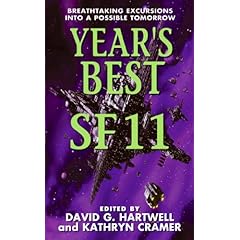 by Matthew Jarpe
by Matthew JarpeFinally, a real corker! This is a mix of Niven, Pohl, and the died-way-too-soon Mike McQuay. Jarpe piles on the tropes, but at a steady and exciting rate. It would have been dangerous to add more than he does (Kuiper Belt colonies; cyborgs; atomic space combat; super-science private eyes; replicants; data mongers; autonomous spacecraft; teenaged romance) or as much in a shorter story (Jarpe himself says that 8,000 words is a "sweet spot" for his style, which might limit the markets that take his stuff, alas). But, pretty much all of them are recognizable to the regular reader of sf, so none of it calls for much explanation. For some reason I can't nail down, it also doesn't feel like any of it is too convenient when it appears, or too "made up." When I read the work of wannabe sf writers, a problem I often see is that they feel obliged (or maybe just "allowed") to have helpful robots, super aliens, or secret weapons just appear out of nowhere when nothing else will move the plot along. This is almost always a bad idea, though, because it tends to show that the writer was stuck and couldn't think of a logical and convincing way to keep the story going.
 Jarpe's introduction of various gizmos and gimcracks skirts this danger, somehow. I need to think more about why it worked for him, when it usually kills a story for others, but I'll figure it out.
Jarpe's introduction of various gizmos and gimcracks skirts this danger, somehow. I need to think more about why it worked for him, when it usually kills a story for others, but I'll figure it out.Anyway, this was a great story. I'm looking forward to the August, 2007 release of his first novel, "Radio Freefall."
2 comments:
This truly was a corker for all the reasons Stevens cites, but also because Jarpe has the classic "show, don't tell" writing style. Instead of talking about how great the girl looks, he shows the boy's reaction to her. There's a good dose of Bernie Rhodenbarr-esque Laurence Block-iness here as well.
Good fun, good writing. I'm looking forward to reading the next two of his we're doing.
Oh, yes, Liz has this exactly right. Jarpe goes beyond mere "show, don't tell" by doing more than describing the scene/action/events. He does give such descriptions, but only enough to move beyond them to the effects had by the things he describes on his characters. That elevates his prose from something merely craftsmanly to a kind of empathic meld with the reader. It's not especially beautiful, nor moving. But it is crackling in the mind.
More about this guy's stuff real soon...
Post a Comment